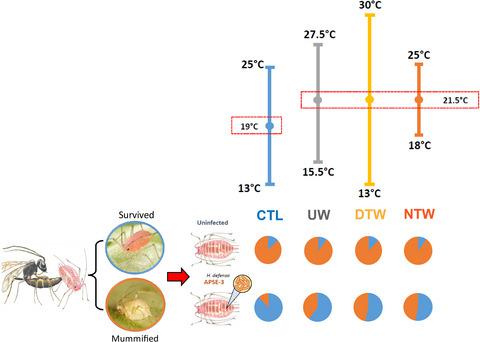当前位置:
X-MOL 学术
›
J. Anim. Ecol.
›
论文详情
Our official English website, www.x-mol.net, welcomes your
feedback! (Note: you will need to create a separate account there.)
Warmer nights offer no respite for a defensive mutualism
Journal of Animal Ecology ( IF 3.5 ) Pub Date : 2020-05-27 , DOI: 10.1111/1365-2656.13238 Clesson H V Higashi 1 , Brandon T Barton 2 , Kerry M Oliver 1
Journal of Animal Ecology ( IF 3.5 ) Pub Date : 2020-05-27 , DOI: 10.1111/1365-2656.13238 Clesson H V Higashi 1 , Brandon T Barton 2 , Kerry M Oliver 1
Affiliation

|
1.Ecologically-relevant symbioses are widespread in terrestrial arthropods but based on recent findings these specialized interactions are likely to be especially vulnerable to climate warming. Importantly, empirical data and climate models indicate that warming is occurring asynchronously, with nighttime temperatures increasing faster than daytime temperatures. Daytime (DTW) and nighttime warming (NTW) may impact ectothermic animals and their interactions differently as DTW results in greater daily temperature variation and moves organisms nearer to their thermal limits, while NTW avoids thermal limits and may relieve constraints of cooler nighttime temperatures; a nuance that has largely been ignored in the literature. 2.In laboratory experiments, we investigated how the timing of warming influences a widespread defensive mutualism involving the pea aphid, Acyrthosiphon pisum, and its heritable symbiont, Hamiltonella defensa, which protects against an important natural enemy, the parasitic wasp Aphidius ervi. 3.Three aphid sublines were experimentally created from single aphid genotype susceptible to A. ervi: one line infected with a highly protective H. defensa strain (APSE-3), one infected with a moderately protective strain (APSE-8), and one without any facultative symbiont. We examined aphid fitness in the presence and absence of parasitoids and when exposed to an average 2.5°C increase occurring across three warming scenarios (nighttime vs. daytime vs. uniform) relative to no-warming controls. 4.An increase of 2.5°C, as predicted to occur by the IPCC before 2100, was sufficient to disable the aphid defensive mutualism regardless of the timing of warming; a surprising result given that the daily maxima for control and nighttime warming scenarios were identical. We also found that warming negatively impacted i) symbiont-mediated interactions between host and parasitoid more than symbiont-free ones, ii) species interactions (host-parasitoid) more than each participant independently, and iii) aphids more than parasitoids even though higher trophic levels are generally predicted to be more affected by warming. 5.Here we show that 2.5°C warming, regardless of timing, negatively impacted a common microbe-mediated defensive mutualism. While this was a lab-based study, results suggest that temperature increases predicted in the near-term may disrupt the many ecological symbioses present in terrestrial ecosystems.
中文翻译:

温暖的夜晚无法让防御性共生主义得到喘息
1.生态相关的共生在陆地节肢动物中很普遍,但根据最近的发现,这些专门的相互作用可能特别容易受到气候变暖的影响。重要的是,经验数据和气候模型表明变暖是异步发生的,夜间温度比白天温度升高得更快。白天 (DTW) 和夜间变暖 (NTW) 可能对变温动物及其相互作用产生不同的影响,因为 DTW 会导致更大的每日温度变化并使生物体更接近其热极限,而 NTW 避免热极限并可能减轻夜间温度较低的限制;在文献中很大程度上被忽略的细微差别。2.在实验室实验中,我们调查了变暖的时间如何影响广泛的防御性共生关系,涉及豌豆蚜虫 Acyrthosiphon pisum 及其可遗传的共生体 Hamiltonella defensa,该共生体保护重要的天敌,寄生蜂蚜虫。3.从对 A. ervi 敏感的单一蚜虫基因型实验性地创建了三个蚜虫亚系:一个系感染了高度保护性 H. defensa 菌株 (APSE-3),一个感染了中等保护性菌株 (APSE-8),以及一个没有任何兼性共生体。我们检查了在存在和不存在寄生蜂的情况下,以及在三种变暖情景(夜间与白天与均匀)中相对于无变暖对照发生的平均 2.5°C 升高时蚜虫的适应性。4.IPCC 预计在 2100 年之前会增加 2.5°C,无论变暖的时间如何,都足以使蚜虫防御性共生失效;考虑到控制和夜间变暖情景的每日最大值是相同的,这是一个令人惊讶的结果。我们还发现变暖对 i) 寄主和寄生物之间的共生介导的相互作用产生了负面影响,ii) 物种相互作用(寄主-寄生物)比每个参与者独立的多,iii)蚜虫比寄生物更多,即使更高的营养普遍预测水平受变暖的影响更大。5. 在这里,我们表明 2.5°C 的变暖,无论时间如何,都会对常见的微生物介导的防御性共生产生负面影响。虽然这是一项基于实验室的研究,但结果表明,近期预测的温度升高可能会破坏陆地生态系统中存在的许多生态共生。
更新日期:2020-05-27
中文翻译:

温暖的夜晚无法让防御性共生主义得到喘息
1.生态相关的共生在陆地节肢动物中很普遍,但根据最近的发现,这些专门的相互作用可能特别容易受到气候变暖的影响。重要的是,经验数据和气候模型表明变暖是异步发生的,夜间温度比白天温度升高得更快。白天 (DTW) 和夜间变暖 (NTW) 可能对变温动物及其相互作用产生不同的影响,因为 DTW 会导致更大的每日温度变化并使生物体更接近其热极限,而 NTW 避免热极限并可能减轻夜间温度较低的限制;在文献中很大程度上被忽略的细微差别。2.在实验室实验中,我们调查了变暖的时间如何影响广泛的防御性共生关系,涉及豌豆蚜虫 Acyrthosiphon pisum 及其可遗传的共生体 Hamiltonella defensa,该共生体保护重要的天敌,寄生蜂蚜虫。3.从对 A. ervi 敏感的单一蚜虫基因型实验性地创建了三个蚜虫亚系:一个系感染了高度保护性 H. defensa 菌株 (APSE-3),一个感染了中等保护性菌株 (APSE-8),以及一个没有任何兼性共生体。我们检查了在存在和不存在寄生蜂的情况下,以及在三种变暖情景(夜间与白天与均匀)中相对于无变暖对照发生的平均 2.5°C 升高时蚜虫的适应性。4.IPCC 预计在 2100 年之前会增加 2.5°C,无论变暖的时间如何,都足以使蚜虫防御性共生失效;考虑到控制和夜间变暖情景的每日最大值是相同的,这是一个令人惊讶的结果。我们还发现变暖对 i) 寄主和寄生物之间的共生介导的相互作用产生了负面影响,ii) 物种相互作用(寄主-寄生物)比每个参与者独立的多,iii)蚜虫比寄生物更多,即使更高的营养普遍预测水平受变暖的影响更大。5. 在这里,我们表明 2.5°C 的变暖,无论时间如何,都会对常见的微生物介导的防御性共生产生负面影响。虽然这是一项基于实验室的研究,但结果表明,近期预测的温度升高可能会破坏陆地生态系统中存在的许多生态共生。











































 京公网安备 11010802027423号
京公网安备 11010802027423号